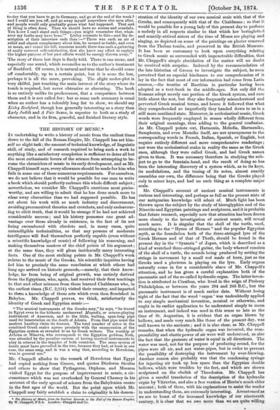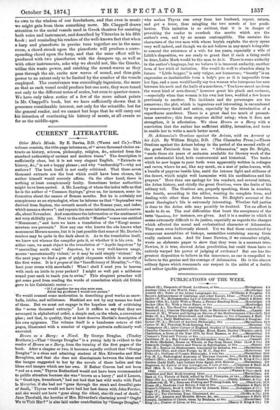THE HISTORY OF MUSIC.* Is undertaking to write a history
of music from the earliest times down to the fall of the Roman Empire, Mr. Chappell has set him- self no slight task; the amount of technical knowledge, of linguistic skill, of study, and of research required to bring such a work to anything like a satisfactory completion is sufficient to deter all but the most enthusiastic lovers of the science from attempting to be- come the chroniclers of music in its early development, and as Mr.
Chappell himself says, every allowance should be made for him who fails in some one of these numerous requirements. For ourselves, we do not believe that it would be possible for one man to write a book which should perfectly embrace this whole difficult subject ; nevertheless, we consider Mr. Chappell's exertions most praise- worthy, and are willing to admit that he has done much more to clear away obscurities than we had supposed possible. He has set about his work with so much industry and discernment, avoiding preconceived theories and crotchets, and only endeavour- ing to elicit truth, that it would be strange if he had not achieved considerable success ; and his history possesses one great ad- vantage over those already in existence, in the fact of its not being encumbered with obsolete and, in many cases, quite unintelligible technicalities, so that any persons of moderate intelligence will find 'themselves perfectly capable (even withou -a scientific knowledge of music) of following his reasoning, and making themselves masters of the chief points of his argument ; at the same time, they will glean incidentally many interesting
facts. One of the most striking points in Mr. Chappell's work relates to the music of the Greeks, his scientific inquiries having led him to precisely the same conclusion at which others had long ago arrived on historic grounds,—namely, that their know-
ledge, far from being of original growth, was entirely derived from the Egyptians, who, again, had received their first teachings in that and other sciences from those learned Chaldteans who, in the earliest times (B.C. 2,014) visited their country, and imparted to them a knowledge of those arts which even then flourished in Babylon. Mr. Chappell proves, we think, satisfactorily the identity of Greek and Egyptian music :—
"The musical instruments of the Greeks may," he says, "be traced in Egypt even to the hitherto unobserved Magadis or octave-playing instrument of Anacreon, and to the little, wailing, span-long pipe used for lamentation on the death of Adonis. From that pipe must the modern hautboy claim its descent. The total number of notes in the "combined Greek scales agrees precisely with the enumeration ,of the Egyptian system as revealed to us by Greek writers. The worship of Athena or Minerva, who corresponds to the Egyptian goddess, Neth, was attended by the peculiar custom of having musical instruments to play in octaves in the temples of both countries. The same system of music must have prevailed in the two, because they had, at least in one case, the same song, and it was a song that, according to Herodotus, was in general use."
Mr. Chappell alludes to the remark of Herodotuis that Egypt had copied nothing from Greece, and quotes Diodorus Siculus and others to show that Pythagoras, Orpheus, and Musmus visited Egypt for the purpose of improvement in music, a cir- cumstance which was not overlooked by General Chesney in his -account of the early spread of science from the Babylonian centre in the first ages of the world. But the point upon which Mr. Chappell may fairly establish a claim to originality is his demon-
* The History at Music, from the Earliest Records to the Fall 01 155 Roman Empire. By W. Chappell, F.S.A. London: Chappell and Co. stration of the identity of our own musical scale with that of the Greeks, and consequently with that of the Chaldseans ; so that it would be possible for a young lady of this present day to perform a melody in all respects similar to that which her beringletted and scantily-attired sisters of the time of Moses are playing and singing, as depicted on some of the paintings on plaster removed from the Theban tombs, and preserved in the British Museum. It has been so customary to look upon everything relating to Greek music as surrounded with impenetrable difficulties, that Mr. Chappell's simple elucidation of the matter will no doubt be received with surprise. Induced by the recommendation of the late historian of Greece to investigate the subject, he soon perceived that an especial hindrance to our comprehension of it lay in the fact that most of our information had come from Latin sources,—the treatise of Boethius in particular having been adopted as a text-book in the middle-ages. Not only did the Romans adopt merely one portion of the Greek system, and care little about the rest, but they also frequently misunderstood and perverted Greek musical terms, and hence it followed that what they comprehended so imperfectly they handed down to us in a still more mutilated state. Moreover, in ecclesiastical music, Greek words were frequently employed in senses wholly different from their original meanings, thus adding to the general confusion. As Mr. Chappell points out, Harmonia, Melodia, Harmonike, Sumphonia, and even Mousike itself, are not synonymous to the corresponding words in French, Italian, Spanish, or English, but require entirely different and more comprehensive renderings ; nor were the ecclesiastical scales in reality the same as the Greek ones, although they were called Greek, and had Greek names given to them. It was necessary therefore in studying the sub- ject to go to the fountain-head, and the result of doing so has been the interesting discovery of a system which, as to its keys, its modulations, and the tuning of its notes, almost exactly resembles our own, the difference being that the Greeks played only in minor keys, and had no such thing as a complete major scale.
Mr. Chappell's account of ancient musical instruments is curious and interesting, and perhaps as full as the present state of our antiquarian knowledge will admit of. Much light has been thrown upon the subject by the study of hieroglyphics and of the Ninevite and Egyptian paintings and sculptures, and it is probable that future research, especially now that attention has-been drawn more closely to the investigation of ancient music, will reveal much more. It is singular that the shell of the turtle, used, according to the "Hymn of Hermes" and the popular Egyptian myth, as the foundation both of the three-stringed lyre of the Greek Hermes and of that of Thoth, should be found in the present day in the " Syamsia " of Japan, which is described as a kind of wretched three-stringed guitar, the body whereof consists of the shell of a turtle, the sounds being produced by setting the strings in movement by a small rod made of horn, just as the Greeks used a plectrum in playing on the lyre. Early organs naturally come in for a considerable share of Mr. Chappell's attention, and he has given a careful explanation both of the pneumatic and of the so-called hydraulic organ. The latter inven- tion is attributed to Ctesibus, who lived in the reign of Ptolemy Philadelphus, or between the years 284 and 246 B.C., but the pneumatic instrument is of much earlier date. Without losing sight of the fact that the word 'organ' was undoubtedly applied to any simple mechanical invention, musical or otherwise, and ought in its earlier application to be understood simply to mean an instrument, and indeed was used in this sense so late as the time of St. Augustine, it is evident that an organ blown by bellows, and made very much like those of the present day, was well known to the ancients ; and it is also clear, as Mr. Chappell remarks, that when the hydraulic organ was invented, the com- pressibility and elastic power of air were well understood, as also the fact that the pressure of water is equal in all directions. The water was used, not for the purpose of producing sound, for the pipes were all air, and not water-pipes, but in order to prevent the possibility of destroying the instrument by over-blowing. Another reason also probably was that the condensing syringe for injecting air took up less space than the Egyptian double bellows, which were trodden by the feet, and which are shown sculptured on the obelisk of Theodosius. Mr. Chappell has given a careful translation of the description of the hydraulic organ by Vitruvius, and also a free version of Heron's much older account ; both of these, with his explanations to assist the reader in understanding them, are extremely interesting. Accustomed as we are to boast of the increased knowledge of our nineteenth century, it is clear that we owe more than we are quite willing
to own to the wisdom of our forefathers, and that even in music we might gain from them something more. Mr. Chappell draws attention to the metal vessels used in Greek theatres for assisting both voice and instrument, and described by Vitruvius in his fifth took; and reminding his readers of the well-known fact that when a harp and pianoforte in precise tune together are in the same room, a chord struck upon the pianoforte will produce a corre- sponding chord upon the harp, and that the same effect will be produced with two pianofortes with the dampers up, as well as with other instruments, asks why we should not, like the Greeks, utilise this waste power, and catching the sound-waves as they pass through the air, excite new waves of sound, and thus gain power to an extent only to be limited by the number of the vessels employed. The contrivance was exceedingly ingenious, the more so that as each vessel could produce but one note, they were tuned not only to the different notes of scales, but even to quarter-tones. We have only taken notice of a few of the more salient points in Mr. Chappell's book, but we have sufficiently shown that it possesses considerable interest, not only for the scientific, but for the general reader, and we cannot but hope that he will carry out his intention of continuing his history of music, at all events so far as the middle-ages.



































 Previous page
Previous page